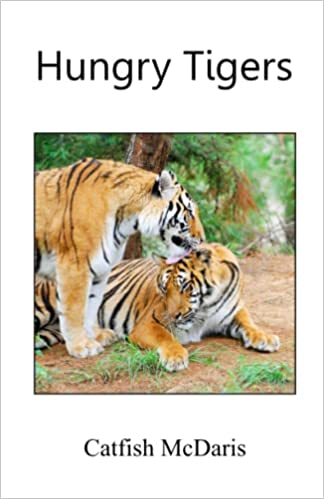
Hungry Tigers Paperback – April 5, 2023 by Catfish McDaris (Author)
Overall, the poem seems to be exploring themes of transience, loss, and the power of nature to evoke intense emotions. The use of sensory language and metaphors creates a dreamlike quality that invites the reader to interpret and find meaning in the images presented.
Amazon USAHungry Tigers Paperback – April 5, 2023 by Catfish McDaris (Author)
- Publisher : Cyberwit.net (April 5, 2023)
- Language : English
- Paperback : 60 pages
- ISBN-10 : 8196202636
- ISBN-13 : 978-8196202637
- Item Weight : 4.5 ounces
- Dimensions : 5.5 x 0.15 x 8.5 inches
- Best Sellers Rank: #3,035,012 in Books
The poet has aptly used the conversational language of modern poetry. These poems make it evident that the poet is committed to sincerely reveal the heart’s desire in in highly concrete and rich images. This allows the poet a tremendous richness and coherence.
Listening to the sun
Hearing the moon whisper
Watching trees embrace
The paths of nomads through the desert
The shark that can’t stop moving
A speck of sand in a half empty hourglass
The beautiful lady shattered his soul
He became a husk of a man
Then stared into the sun until he went blind. (Nomads)
This is a collection of poetic and metaphorical phrases, each describing different images or ideas. The phrases are not connected in a clear narrative or message, but rather seem to be evoking emotions and sensations through the use of sensory imagery.
The above three phrases create a sense of movement and impermanence, with the image of nomads in the desert, a shark in constant motion, and a half-empty hourglass.The final three phrases create a sense of loss and despair, as the beautiful lady shatters the soul of the protagonist, who becomes a husk of a man and ultimately turns to self-destructive behavior by staring into the sun until he goes blind.
Overall, the poem seems to be exploring themes of transience, loss, and the power of nature to evoke intense emotions. The use of sensory language and metaphors creates a dreamlike quality that invites the reader to interpret and find meaning in the images presented.
We are impressed with:
My thoughts are
hungry tigers
They are perfect
and dangerous
The tigers could claw
you into death ribbons
Faster than a
hummingbird in flight
An earthquake
a tidal wave
a land shark
a hurricane tornado
A woman screaming
in childbirth
biting the finger off
from her loving husband
Words are hungry tigers
and poems. (Hungry Tigers)
The above explores the power and danger of words. The opening lines, "My thoughts are hungry tigers", create a metaphorical comparison between the speaker's thoughts and the fierce, predatory nature of tigers. The speaker acknowledges the beauty and danger of their thoughts, suggesting that they are both perfect and dangerous.
The poem then continues to describe the potential harm that words can cause, using vivid imagery and metaphors. The tigers could "claw you into death ribbons", suggesting that words have the power to harm and even kill. The comparison to a hummingbird in flight emphasizes the speed and agility of words, while the images of an earthquake, tidal wave, land shark, hurricane, and tornado suggest the destructive force that words can unleash.
The poem then takes a darker turn, with the image of a woman screaming in childbirth and biting off the finger of her loving husband. This image suggests the intense and uncontrollable emotions that words can evoke, as well as the potential for violence.
The final lines of the poem, "Words are hungry tigers and poems", bring the metaphor full circle, suggesting that the power and danger of words is particularly acute in the context of poetry. Overall, the poem is a powerful exploration of the ways in which words can both captivate and destroy us.
Must Read!
by Ruchi Agarwal
